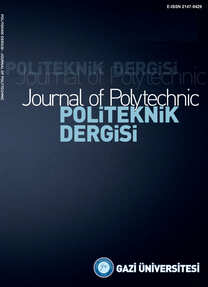Design and performance analysis of controller area network cut-through bridges
Kontrol alan ağı doğrudan geçişli köprülerinin dizaynı ve performans analizi
___
- 1. Bosch, CAN Specification, Version 2.0, Robert Bosch GmbH, Germany, 1991.
- 2. Thomas, G. M., Real-Time Performance of Bridged CAN Networks, CAN Newsletter, pp. 50-52, September 1998.
- 3. Halsall, F., Data Communications, Computer Networks and Open Systems, Fourth Edition, Addison-Wesley Publishing Company Inc, USA, 1996.
- 4. Kwok, C. & K., Mukherjee, B., Cut Through Bridging for CSMA/CD Local Area Networks, IEEE Trans. Commun., vol. 38, no. 7, pp. 938- 942, 1990.
- 5. Tenruh, M., Stipidis, E., English, M. J., Design and Software Implementation of a CAN/CAN Cut-through Bridge, Proc. 6th ICC Conference, Italy, pp. 1007-1013, 1999.
- 6. Lawrenz, W., CAN System Engineering From Theory to Practical Applications, Springer- Verlag Inc., New York, 1997.
- ISSN: 1302-0900
- Yayın Aralığı: 6
- Başlangıç: 1998
- Yayıncı: GAZİ ÜNİVERSİTESİ
Ağaç malzemede yüzey düzgünlüğüne, rendelemede kesiş yönü, bıçak sayısı ve çeşidinin etkileri
Fırçasız doğru akım motorlarının algılayıcısız hız kontrolü
MEHMET GEDİKPINAR, HANİFİ GÜLDEMİR
Anahtarlamalı relüktans motorun endüktans değişiminin sinirsel bulanık modellenmesi
ADNAN AKKURT, ULVİ ŞEKER, Fevzi ERCAN
CEMİL ÇETİNKAYA, Süleyman TEKELİ, Osman KURTULUŞ
An in-depth analysis of CAN bit-timing and delay sources
Isı taşınımına manyetik alanın etkisi
HİDRİD OLUŞUMUNA ETKİ EDEN PARAMETRELERİN NÜMERİK OLARAK İNCELENMESİ
İSAK KOTCİOĞLU, Yüksel KAPLAN, Mahmut D. MAT, T. Nejat VEZİROĞLU
Design and performance analysis of controller area network cut-through bridges
Ahşap tutkallı birleşmelerde yapışma performansına sıcaklık artışının etkileri
